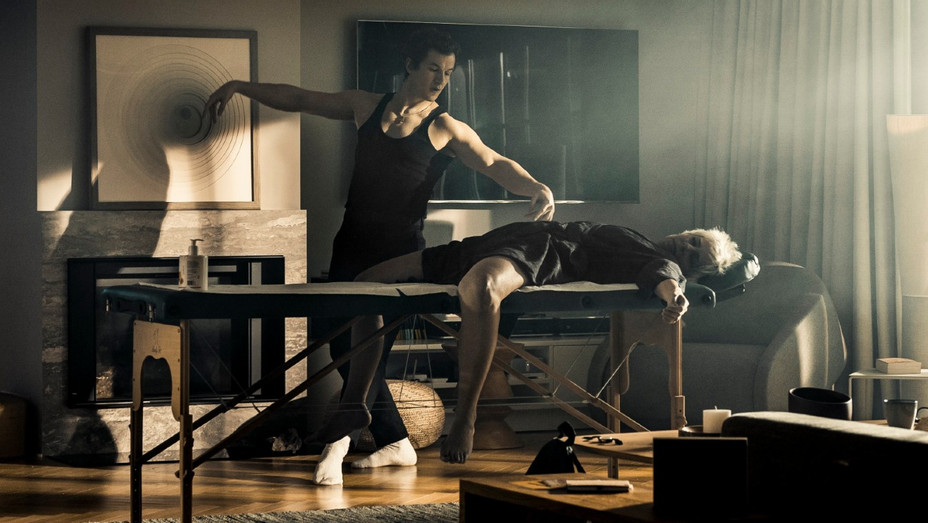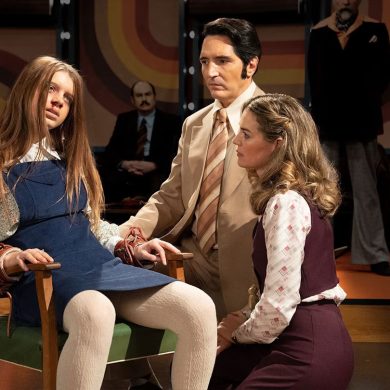Day three and it is Polish dramedy Never Gonna Snow Again and Christian Petzold’s Undine, two films that aim for magical realism but don’t quite hit the mark.
Never Gonna Snow Again


The trope of the magical stranger is an enduring one because it allows us to look at our own society and culture, for better or worse, through the eyes of an outsider. This outsider will always profoundly change the lives of those around them through their innocent, maybe even naïve, outlook and usually some kind of strange ability that brings a little dash of magic into the banalities of everyday life. Some examples that immediately spring to mind are Pier Paolo Pasolini’s Teorema, the Peter Sellers-starring Being There and of course Johnny Depp’s eponymous Edward Scissorhands, with which the Polish dramedy Never Gonna Snow Again has some similarities.
In an upwardly mobile gated community somewhere in Poland, the quiet and mysterious Ukranian masseuse Zhenia (Alec Utgoff) plies his trade, going from house to house, floating in and out of the lives of his exclusive clientele. Through his work he bears witness to their faults, fears and foibles, some of which are inconsequential while others are devastating. The strange thing about Zhenia is he was born in Pripyat just outside Chernobyl, and the nuclear disaster just may have given him psychic powers, allowing him to make deeper connections to his customers and break through their suffocating ennui.
Like Edward Scissorhands, Zhenia uses his hands to provide a kind of therapy to a group of disillusioned middle-aged townsfolk in their cookie-cutter houses. Whereas Edward cuts women’s hair, Zhenia provides a deeply satisfying massage but also channels his psychic energy as he does so, putting them into a trance so they can relax and he can experience an idyllic life of privilege he is otherwise denied. Of course, the shiny baubles and immaculate furnishings hide a rot that has set in amidst the lives of these idle rich, and, as the innocent outsider, Zhenia provides a screen on which these characters can project their myriad disappointments and regrets.
It is a shame that, like the wealthy Polish community it is satirising, Never Gonna Snow Again is all surface sheen with very shallow depths to explore. With its disparate characters all playing out their domestic tragedies in their own vignettes, with Zhenia the only constant between them, co-writer/directors Małgorzata Szumowska and Michał Englert spread themselves too thin, softening any impact these stories might have on their own. The film is gloriously shot, with scenes and set-ups composed with a painterly eye, and the concept of the mysterious stranger who may or may not have supernatural powers is intriguing, but it aims for an ambiguity that doesn’t quite satisfy.
Directors: Malgorzata Szumowska, Michal Englert
Cast: Alec Utgoff, Maja Ostaszewska, Agata Kulesza
Writers: Michal Englert, Malgorzata Szumowska
Undine


In films such as The Shape of Water, Splash and Night Tide, a romance blossoms between a human and a supernatural being from the aquatic depths, and as their worlds cross over all manner of complications arise that threaten the love between them. Christian Petzold’s latest film Undine aims for a similar romantic entanglement but dials everything so far back as to be almost an afterthought, in a very low-key love story with only a merest hint of magical realism.
Undine (Paula Beer) is an architectural historian working for the Berlin government, giving lectures on the changing face of the city since reunification in the early Nineties. After a messy break-up she encounters industrial diver Christoph (Franz Rogowski) in a café. When their meet-cute results in the destruction of the café’s aquarium the two would-be lovers are literally washed away on a tide of passion. They quickly fall in love but before too long tragedy strikes, muddying their picture-perfect coupling.
Undine is a film of signs and portents. There is something very mystical about Undine and Christoph’s meeting and subsequent relationship, and little incidents occur which point towards greater consequences in their future. At the time these don’t have much impact in isolation but then it quickly becomes clear that there may be larger, more unknowable forces at play. Undine sees Christoph as an aquatic saviour that has come to rescue her from her desperation. Yet, for Christoph, he had already read the name Undine on some submerged stonework in the lake where he works as a diver, which he reads as fate working to bring them together. These moments all lead toward a twist which, unfortunately, sinks when it should swim.
It is a beautiful looking and well-acted film (Paula Beer won Best Actress at the Berlin Film Festival) with a believable central relationship. There are also some of those magical moments which do resonate, especially in the murky depths of the lake where the inky blackness waits, ready to engulf the star-crossed lovers at any moment. However, in the end the film feels so slight as to be almost pointless. Not enough is made of the magic and mysticism to make it feel vital to the storytelling, which make its more important moments feel unearned.
Director: Christian Petzold
Cast: Paula Beer, Franz Rogowski, Maryam Zaree
Writer: Christian Petzold




